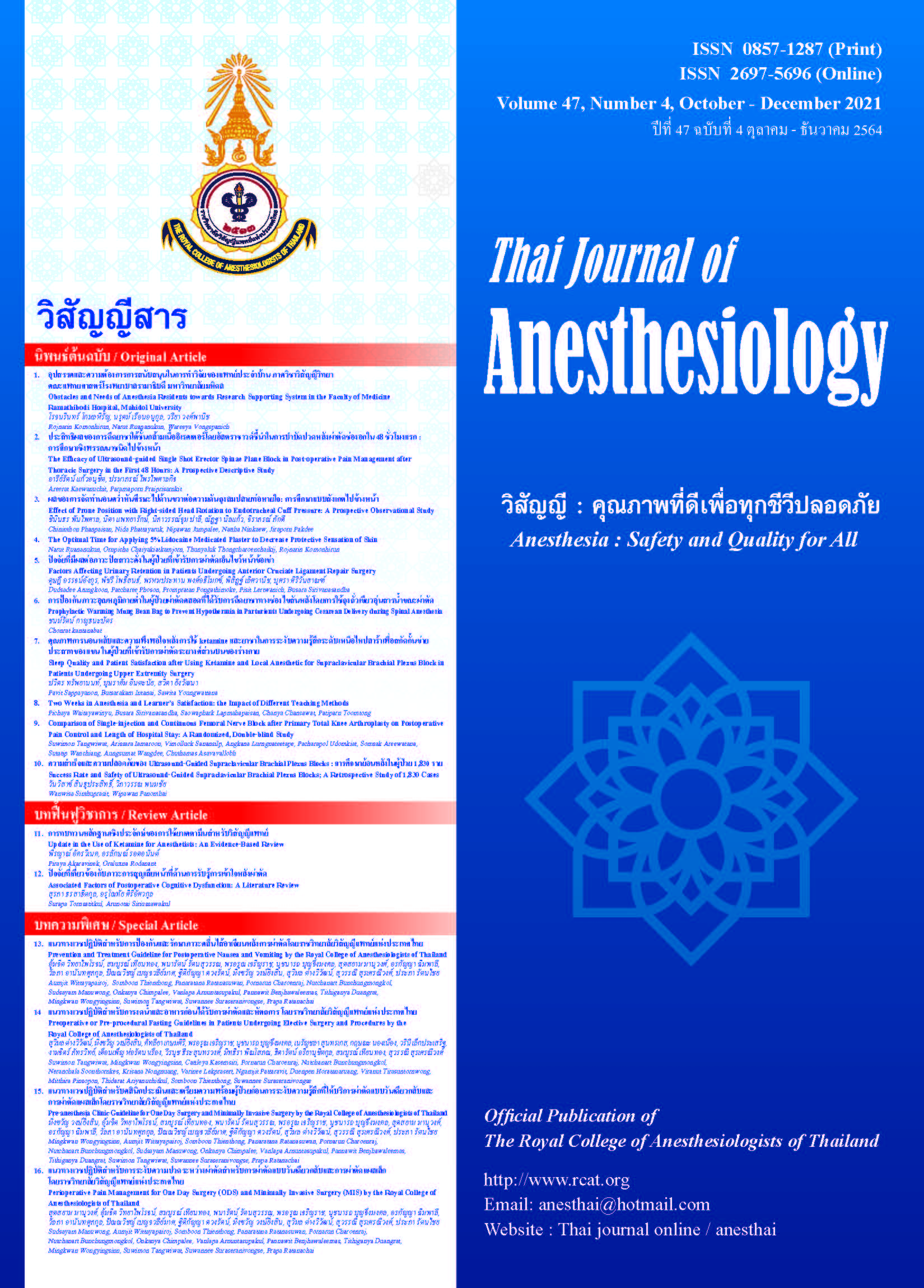Obstacles and Needs of Anesthesia Residents towards Research Supporting System in the Faculty of Medicine Ramathibodi Hospital, Mahidol University
Main Article Content
Abstract
Background: Research in Anesthesiology Residency Program is developed to increase knowledge and clinical experience. This study aimed to describe obstacles and needs of the residents in supporting research participation during residency training program. Methods: We conducted a survey among all residents in the program (N=51). The questionnaire comprised questions of demographic data, levels of research interest, the obstacles to research and the possible supports that are needed. Descriptive and correlational statistics were analysed. Results: Forty-one anesthesiology residents (80.39%) participated in this study. Mean age was 28.37±1.39 years. Most of them were female (n=33). Sixteen, thirteen and twelve participants were in the 1st, 2nd and 3rd year residency training, respectively. The average scores of advisor’s attentiveness and residents’ interest towards research were 8.1±2.12 and 7.22±1.88, accordingly. ‘Having little research skills’ was the highest rated obstacle (score 4.33), whereas ‘writing protocol or manuscript in valid English’ was the highest rated need to support (score 4.16). Conclusion: Lack of research skills was the key obstacle on doing research. Furthermore, most residents required English skills support for manuscript writing.
Article Details

This work is licensed under a Creative Commons Attribution-NonCommercial-NoDerivatives 4.0 International License.
References
and Training Criteria for Anesthesiology Residency Programs,
2017 [Internet]. Cited 2021 Feb 17. Available from: http://
www.anesthai.org/th/news/view/9
2. Rivera JA, Levine RB, Wright SM. Completing a scholarly
project during residency training. Perspectives of residents
who have been successful. J Gen Intern Med 2005;20:366-9.
3. Hebert RS, Levine RB, Smith CG, Wright SM. A systematic review
of resident research curricula. Acad Med 2003;78: 61-8.
4. Papasavas P, Filippa D, Reilly P, Chandawarkar R, Kirton O.
Effect of a mandatory research requirement on categorical
resident academic productivity in a university-based general
surgery residency. J Surg Educ 2013;70:715-9.
5. Abramson M. Improving resident education: what does
resident research really have to offer? Trans Am Acad
Ophthalmol Otolaryngol 1977;84:984-5.
6. Does research make for better doctors? Lancet 1993;342:
1063-4.
7. Truong HT, Chan JJ, Leong WL, Sultana R, Koh DL, Sng BL.
Interest and experience of anaesthesiology residents in
doing research during residency training. Indian J Anaesth
2019;63:42-8.
8. Chan JY, Narasimhalu K, Goh O, et al. Resident research: why
some do and others don’t. Singapore Med J 2017;58:212-7.
9. Cronbach JL. Essentials of psychological testing. 5th ed. New
York: HarperCollins, 1990.
10. Aslam A, Khan DA, Hassan SH, Bashir H. Research
challenges for postgraduate residents in dentistry. Pak Oral
Dent J 2016;36:4.
11. Alguire PC, Anderson WA, Albrecht RR, Poland GA. Resident
research in internal medicine training programs. Ann Intern
Med 1996;124:321-8.
12. Rothberg MB. Overcoming the obstacles to research during
residency: what does it take? JAMA 2012;308:2191-2.
13. Panchal AR, Denninghoff KR, Munger B, Keim SM. Scholar
quest: a residency research program aligned with faculty
goals. West J Emerg Med 2014;15:299-305.
14. Taylor CS, Vijayakumar V. Effective research mentoring of
radiology residents. JACR 2018;15:667-8.


